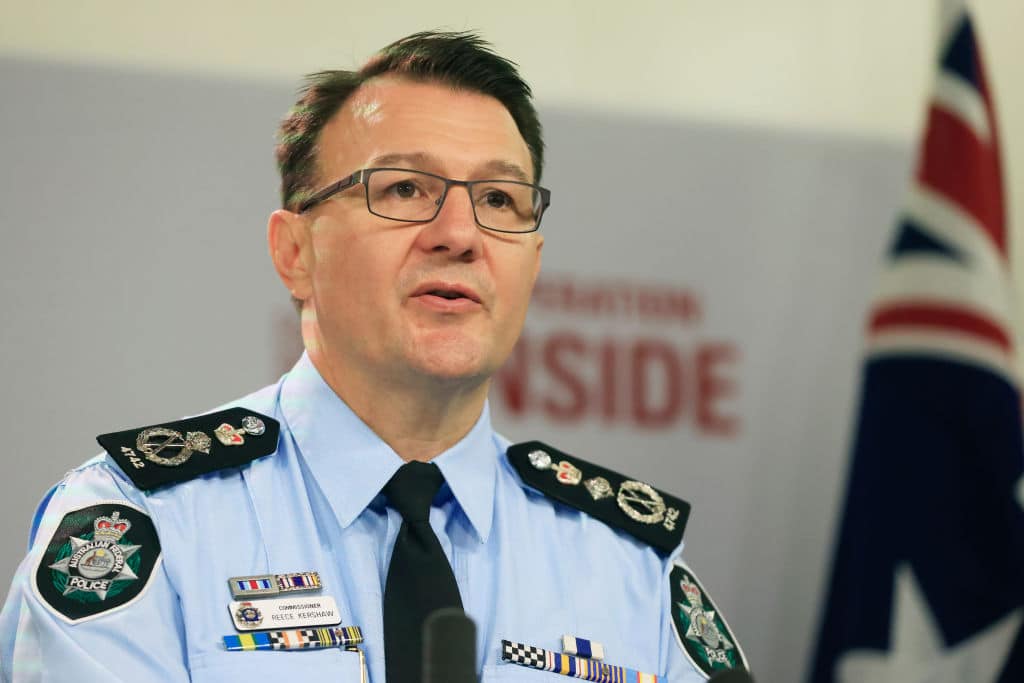Decriminalising illicit drugs – as Labor backbencher Michael Pettersson wants to do in the ACT – would be “a far more dangerous environment” to police, AFP Commissioner Reece Kershaw told a Senate estimates committee this week.
“People get into ice rages and all sorts of things,” Commissioner Kershaw said, addressing the Legal and Constitutional Affairs Legislation Committee on Monday. “It would become a more dangerous society, and it wouldn’t be as safe as what we are enjoying today. For me, it would lead to chaos.”
Mr Pettersson has a bill before the Legislative Assembly to amend the ACT drug laws. It would decriminalise possession of small amounts of hard drugs; those caught in possession would pay a fine and be referred to a medical professional, rather than facing a two-year prison sentence. Drug use should be treated as a health issue, not a criminal one, Mr Pettersson believes.
The bill has been supported by the Alcohol Tobacco and Other Drugs Association (ATODA), Uniting NSW/ACT, Directions Health Services, the ANU Drug Research Network, and the Canberra Alliance for Harm Minimisation and Advocacy.
But, Commissioner Kershaw said: “The evidence is not stacking up that decriminalisation necessarily leads to less crime.”
Illicit drugs facilitated and enabled other crimes, he argued. Drugs were “a causal factor” of domestic violence, and were involved more and more in traffic accidents where people lose their lives.
“Assaults, serious assaults, murder, money laundering – the list goes on of all the different criminal activities that are associated with drug crime.”
Commissioner Kershaw said he was concerned about the rise of heroin, methamphetamine (ice), cocaine, and MDMA (ecstasy) in police seizures.
“These are all very destructive narcotics that often lead to a life of crime for a lot of these individuals,” he said.
Heroin “unfortunately drives people to do incredible things, criminal things, to pay for the cost of these drugs. That unfortunately drives an entire marketplace where, again, a lot of criminality occurs.”
Ice, Commissioner Kershaw said, was “a very addictive drug that is very destructive to society. Lots of violent crimes are committed by people who take methamphetamine.”
It takes seven years on average for a user not to be addicted.
“Most of the time, it’s a tale of destruction, criminality, and woe and misery for these individuals.”
Countries that had decriminalised illicit drugs were changing their policies, Commissioner Kershaw said.
“As police, we’ve seen that that hasn’t worked as effectively. It can have unforeseen consequences.” The Netherlands’ soft drug policy led to ‘narcotourism’, “a lot of organised crime set up and headquartered in Amsterdam”. Portugal “had crime issues attached to it as well”.
Mr Pettersson said he greatly respected Commissioner Kershaw, but encouraged him to consider the views of his predecessor, former AFP Commissioner Mick Palmer, who “strongly supports decriminalisation”.
Seselja: “A damning blow”
Senator for the ACT Zed Seselja, a staunch opponent of decriminalisation, called Commissioner Kershaw’s remarks a “damning blow to proponents of the extreme Greens plan” to decrimnialise illicit drugs.
“Reckless proposals to decriminalise hard drugs disregard the safety of Canberrans going about their day to day lives,” Senator Seselja said.
“There is no such thing as personal use of hard drugs.
“It is an extreme position that looks set to become law in the ACT in the Labor-Greens Alliance, and at a Federal level the Greens have the same policy and the same intention to see hard drugs decriminalised right across the country.”
Pettersson: Fearmongering doesn’t work
Mr Pettersson dismissed Senator Seselja’s remarks as conservative scare tactics.
“Canberrans have engaged in this debate constructively since I first released a draft of the Drugs of Dependence (Personal Use) Amendment Bill,” he said.
“Thankfully, fearmongering and scare campaigns don’t work in Canberra, which the Canberra Liberals should know by now.
“Senator Seselja is insistent that sending Canberrans to jail for possessing small quantities of drugs for their personal use is the right thing to do. I completely disagree. I believe the best way to reduce the harms that drugs cause in our community is to provide appropriate health diversions and resources to those in need.
“Senator Seselja is rightly nervous about the upcoming federal election, and I would advise him not to remind Canberrans of how conservative and out of touch he is if he would like to retain his seat.”
Greens: Decriminalisation would reduce harm
The ACT Greens were committed to supporting evidence-based policy to reduce the harm from drugs on individuals and the broader community, said Johnathan Davis, ACT Greens MLA for Brindabella and ACT Green spokesperson for Drug Harm Reduction.
“The ACT Legislative Assembly spent almost a year engaged in deep conversations with police, the legal profession, and the alcohol and other drug sector to identify ways that we could reduce harm. The overwhelming consensus from experts who work with those impacted by drugs each and every day was to move to a model of decriminalisation.
“I understand and empathise with the temptation to keep doing what we’ve always done. But the reality is, what we’ve always done hasn’t been working. We need a new approach, informed by evidence from other jurisdictions, if we’re serious about reducing the harm from drugs on individuals and in the community.”
Canberra Daily would love to hear from you about a story idea in the Canberra and surrounding region. Click here to submit a news tip.



